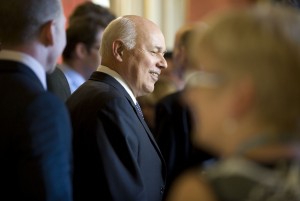Sam Thomas (@iamsamthomas) manages Voices from the Frontline and leads on policy for the MEAM coalition. In this blog he asks what a change in the government’s tone on welfare reform tells us about the need to listen to people when making policy.
The arrival of a new Minister – particularly when it follows a weekend of high drama – often signals a change of tone. So it proved when Stephen Crabb MP, the new Secretary of State for Work and Pensions, made a striking first statement to the House of Commons in that role:
“I am absolutely clear that a compassionate and fair welfare system should not just be about numbers; behind every statistic there is a human being, and perhaps sometimes in government we forget that.”
It was prompted by his predecessor’s extraordinary departure from government. Iain Duncan-Smith claimed cuts to benefits he had overseen – the effects of which the MEAM coalition partners and other charities have documented at length – were falling too hard on the most vulnerable.

Photo: Cabinet Office, used under CC BY-NC 2.0)
This recognition is welcome, and with it comes the hope for a more measured and careful approach to reforming the welfare system. Just as striking to me, though, is the idea that in government it is easy to forget the impact of policies on real people – particularly when they don’t have a prominent voice.
We shouldn’t assume this problem is limited to politicians: prominent charities have been criticised (sometimes fairly, sometimes not) for losing sight of those they support as they grew in size and complexity. Much of the movement for service user activism and peer support has grown from a sense that the further you get from people, the less you understand about their lives.
Earlier this week I went to a debate at the RSA on the housing crisis, where American ethnographer Matthew Desmond described his work with families who had been or were at risk of being evicted. (You can watch a video on their website.) The stories he told showed how the mortgage crisis, low pay and high rents have reached into every part of people’s lives: not just their stability and security, but their very souls.
All of us, when confronted with these powerful stories – whether about losing your disability benefit or losing your home – have the capacity to be moved. Where we fall down is in our ability to reconcile that with our day jobs, whether as politicians, policymakers or charity professionals: to hold in mind both our moral sense of what’s needed, and our practical knowledge of what’s possible.
I’d suggest two things can help. First, we have a responsibility to ensure that challenging voices are heard. “Hard Edges: the lives behind the numbers”, which launched this week, shares people’s experiences of multiple needs through words, videos and timelines. It’s a powerful piece of work and I urge you to explore and share it.
Secondly, both government and voluntary sector leaders need to get better at finding space for voices and evidence that challenge their perspectives. If ministers are serious about understanding the human impact of their decisions, they should expect us to judge them by their willingness to listen and learn from frontline voices.
That’s where our work at MEAM has a part to play. Through Voices from the Frontline, we’ve worked hard to help policymakers and politicians to understand how reforms to public services and changes to welfare are affecting people’s lives. From June, when the project ends, Lankelly Chase are supporting us to continue our work, building it further into the day-to-day policy activities of Clinks, Homeless Link and Mind, working closely with our members and the people they support.
In all this work, we’ll be guided by our belief that charities have a responsibility not just to share the stories that they encounter through their work, but to understand what those stories mean for our own decisions, and those that we seek to influence.
